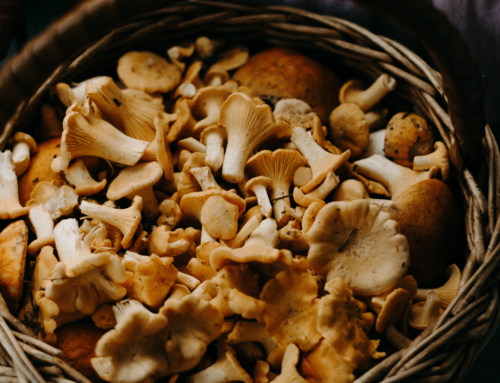Mushrooms are great sources of protein, fiber, B vitamins (especially niacin), vitamin C, calcium, minerals, and selenium. They also contain antioxidants that are unique to mushrooms, such as ergothioneine, which according to studies is a highly powerful antioxidant.
Many mushrooms are good sources of selenium, an antioxidant mineral, as well as copper, niacin, potassium and phosphorous. Additionally, mushrooms provide protein, vitamin C and iron. Because their cells walls are undigestible unless exposed to heat, you must cook mushrooms to get their nutritional benefits.
Outstanding Fungal Benefits
The earth’s soil is home to large populations of natural agents that help promote the environment. One of them is the fungi mushroom, which helps restore pollution-damaged habitats, acts as natural pesticides, and even provides a sustainable fuel called Econol.
While mushrooms have the ability to support Mother Nature, they are also capable of promoting your own health, from helping strengthen your immune system to preventing debilitating diseases. Some benefits that you may enjoy from consuming mushrooms are:
- Weight management – One study showed that substituting red meat with white button mushrooms may support a healthy weight.
- Improved nutrition – Adding more mushrooms to your diet may help improve diet quality.
- Optimal vitamin D levels– Eating certain mushroom species is seen in a study to be more effective than taking vitamin D2 supplements.
- Optimal digestive function – Mushrooms support your gastrointestinal health, thanks to their supply of dietary fiber and fungal enzymes.
- Antibacterial properties – Penicillin, streptomycin, and tetracycline are all derived from fungal extracts.
It’s small wonder that mushrooms are now gaining a superfood reputation. I recommend you to add more of them to your diet or consume them indirectly through supplementation. But first, let me explain to you how mushrooms support your health.
Edible Mushrooms with Medicinal Properties

Oyster Mushroom
Oyster Mushrooms derive their name from oysters, owing to the similarity in appearance. Potent antioxidant compounds in oyster mushrooms, have sent scientists researching their potential benefits for treating HIV diseases. Apart from this, these mushrooms are contenders for protecting against cancers and facilitating healthy cholesterol levels in the body.
Button Mushroom
 Button Mushrooms, possessing specific kind of carbohydrates boost metabolism, thereby keeping blood sugar levels under check. In addition to its high metabolic activity, the white button mushrooms, loaded with selenium, help burn fat, effecting weight loss and preventing the incidence of prostate cancer.
Button Mushrooms, possessing specific kind of carbohydrates boost metabolism, thereby keeping blood sugar levels under check. In addition to its high metabolic activity, the white button mushrooms, loaded with selenium, help burn fat, effecting weight loss and preventing the incidence of prostate cancer.
Shiitake Mushroom
One of the most popular varieties, commonly available in  supermarkets, Shiitake is a classic vegan substitute for meat, boasting of several medicinal compounds. Abundant in Vitamin D, these mushrooms with antiviral compounds help combat infections, keeping diseases at arm’s length. Known in Japanese language, as the ‘Oak Fungus’ these shiitake mushrooms with loads of lentinan are highly beneficial for preventing formation of cancerous tumors in the body.
supermarkets, Shiitake is a classic vegan substitute for meat, boasting of several medicinal compounds. Abundant in Vitamin D, these mushrooms with antiviral compounds help combat infections, keeping diseases at arm’s length. Known in Japanese language, as the ‘Oak Fungus’ these shiitake mushrooms with loads of lentinan are highly beneficial for preventing formation of cancerous tumors in the body.
Enoki Mushrooms
Enoki Mushrooms growing in willowy white clusters have heads resembling a cap. Cultivated in small glass containers, these mushrooms offer health enhancing properties, boosting immunity and providing anti cancerous benefits.

Mycologist Paul Stamets lists 6 ways the mycelium fungus can help save the universe: cleaning polluted soil, making insecticides, treating smallpox and even flu viruses.
To understand how Stamets came to believe mushrooms could save the world, it helps to know how they saved Stamets.
He was born in 1955 in Salem, Ohio, one of four brothers. His father, an engineer, owned a firm that oversaw construction projects for the U.S. Army. Stamets was a shy kid with a crippling stutter who dreamed of becoming a trailblazing scientist. “We lived in a big house with a lab in the basement,” he recalls, “and I looked up every experiment I could find.” He nearly blew the place up on several occasions while tinkering with chemicals.
Then, when he was 12, his father’s business failed and the family splintered. Stamets’ mother decamped with him and his twin brother to a small apartment in Columbiana, Ohio, where they lived in poverty. Eventually, she moved with the boys to her own parents’ vacation home near Seattle and sent them on scholarship to a boarding school in Pennsylvania. Stamets felt like a misfit among preppies. He threw himself into martial arts (later earning black belts in both tae kwon do and hwa rang do) and identified with the counterculture that was reaching its crest.
During his senior year, Stamets and his brother were expelled for selling marijuana to fellow students. They hitchhiked back to Seattle, where they finished high school at a public institution. Stamets spent a summer toiling as a sawmill hand before enrolling at Kenyon College in Ohio. But he still felt out of place and spent hours wandering in the woods off campus.
That’s where he headed the day he tried hallucinogenic psilocybin mushrooms for the first time. He climbed a tree, but was too intoxicated to climb down. Soon a thunderstorm blew in, and he was lashed by rain and wind. As lightning struck nearby, he realized he could die at any moment, yet the scene was overwhelmingly beautiful. He felt part of the forest and the universe as never before. He reflected on his life and how to change it. “Stop stuttering now, Paul,” he told himself, repeating the phrase like a mantra.




